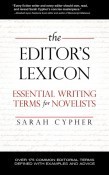Sarah Cypher's Blog, page 13
September 19, 2011
Social Media for Authors: Week 2 of 4
Caveat: This is the week my imagination ran a little wild, dragging me along in a gadarene frenzy behind it. How I got here has more to do with my cart-first nature than with the Social Media Bootcamp course; and how I got back on the horse has everything to do with the quality of the week's lessons.
The first lesson was to choose your tools for carrying out the social media strategy we talked about in Week 1. YouTube? Facebook? Flikr? Twitter?
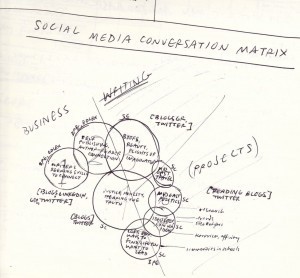 To put it a better way, figure out which online conversations you care about, and establish a presence wherever those conversations happen. I got ahead of the course last week, because not only did I obsessively compel those conversations into a diagram (see right), I picked out Goodreads for its connection to passionate readers; Twitter for its wide reach and popularity among savvy writers and publishing industry pros; and blogs (both reading others' and writing more here), using Google Reader to follow them.
To put it a better way, figure out which online conversations you care about, and establish a presence wherever those conversations happen. I got ahead of the course last week, because not only did I obsessively compel those conversations into a diagram (see right), I picked out Goodreads for its connection to passionate readers; Twitter for its wide reach and popularity among savvy writers and publishing industry pros; and blogs (both reading others' and writing more here), using Google Reader to follow them.
In Week 2, we watched a helpful, barely-five-minutes-long video. Its lesson was to pick your goals, and create a strategy for talking to your audience that invites them to talk, too. Building on last week's lesson that social media does not equal automatic promotion, it said to fit a social media component into a larger campaign. The implied lesson was, "Do something exciting! Something people will talk about!"
About then, the horse got loose.
I've been quasi-planning a solo trip to Beirut for a few months now, and not long ago narrowed down my list of how and when and why. But suddenly I had, possibly, a reason and a way to convert my interesting vacation into a SOCIAL MEDIA EVENT and look for a new angle and blog and what about a project and need a camcorder for YouTube and if I got the kids to write about what they think about immigration and newsworthy… Whoa.
Reel it in, Sarah.
I'm not good at this yet. Three nights passed without sleep–every time I was about to drift off, crash! new idea!–and then I went back to my notebook and started a fresh page. I came up with three simple, clear goals that were directly related to the work I am already doing as a writer and editor, and did not require either a travel itinerary or shipwreck diving experience. (Not exaggerating.)
From there, I reviewed my notes and realized that like writing, social media strategy is about learning to notice the obvious strengths and weaknesses in your own ideas. From there, as writers, we can be creative about how to reach people with what we want to say. And we do need something to say. Otherwise, social media is just a very public way of looking like this.
P.S. I continue to fall in love with Goodreads. Its recommendation feature gets along with e-books better than I realized, and honestly, I just like the people. We talk about books we love. And committing to my presence there doesn't detract from doing things I love: rather, it holds me accountable to sitting down with a for-pleasure, non-work-related, good book every day.
September 15, 2011
A Nurse Ratched Apologia: Reading Ken Kesey Fifty Years Later
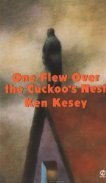 One Flew Over the Cuckoo's Nest by Ken Kesey
One Flew Over the Cuckoo's Nest by Ken Kesey
My rating: 3 of 5 stars
Well-crafted, straightforward, and rendered beautifully, the novel is a public monument to the barefaced sexism of yore. As in most of the novels I enjoy reading, power matters. And as a novel about the friction between authority (Nurse Ratched) and freedom (McMurphy), it holds up almost fifty years after its first publication; it would had survived better, though, if it made less of the "emasculating woman" stereotype. In the tense final pages, when I most wanted to surrender to the story, the novel's sensibility wouldn't let me forget its insistent theme: "This is the outrage, the injustice, that results when a woman who can't get laid has too much power."
Ugh. For sensibility, I'd give the novel one and a half stars. But as Azar Nafisi reminds us in the Henry James portion of Reading Lolita in Tehran, to judge a book solely on the basis of your own values diminishes the art of writing. One Flew Over the Cuckoo's Nest is a damn good novel, and its carelessness toward the women's and civil rights movements of its day shouldn't be confused with a dead heart. As a Pacific Northwest writer, Kesey was sensitive to the plight of Native Americans, and the gentleness and magic with which he wrote Bromden's POV made this more than just a well-plotted story.
So, finally–I read the famous book. As a writer, I learned more about not getting carried away with the beauty of language, and how to keep it under control. From a cultural perspective, I'd say it's valuable to look at the art that enters popular culture with your own eyes; for years, I knew what people meant when they called someone a "Nurse Ratched." Yet now, I wonder about her. Her character was awful, but what made her that way? The Combine? The culture? Her story never had a chance to be told before she entered the American lexicon as a synonym for medical violence. I even have a little underdog-inspired curiosity about her, no thanks to her creator.
September 13, 2011
The First Rule if You Should Fall into a Shark Tank: Don't Cut Yourself
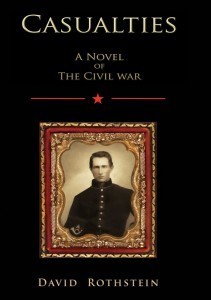
Click to buy this book on Amazon.com
This week's comprehensive post is by successful indie author David Rothstein. His Civil War novel, Casualties, is based on a true story about a woman who set out with a horse and wagon to rescue her husband from a Confederate POW camp. Besides being a compelling story told in a powerful, lyrical narrative voice, the novel has benefited from its veritable marketing juggernaut.
When it comes to approaching well-known authors like Lee Smith, getting his book into stores across the country, and creating film and sales opportunities at every turn, David is in his element. His post earlier this year was popular, so I'm pleased to welcome him back for another round of spirited advice. He'll be on hand to answer your questions and comments, so comment freely!
+++++++++++++++++
The decision to self-publish your manuscript is one that is virtually impossible to reverse.
So if you have a complete or near complete manuscript and you're still unsure whether or not to self-publish or continue the slog to find an agent, there are a few things that you might not know, all of which you should consider.
After much foreplay with many agents, most of which ended with serious heartburn if not heartbreak, I lost patience with the system and decided to self-publish. It's one of the best decisions I've ever made.
In the process I learned some things that, had I known them before pressing the submit button on CreateSpace, would have helped me manage the process and my expectations better.
Here's what I learned. Some of it I knew before I published, although I didn't appreciate the full extent; some of it I didn't know at all and hadn't researched before publishing. I expect that some of this is not news to you, but I hope you find it helpful.
Do not wait until your book is published to send it to potential reviewers. The reason for that is because reviewers want it (if they want it at all) when it's still in manuscript form. BUT IT HAS TO BE THE FINISHED, FINAL DRAFT PRIOR TO PUBLISHING. If you send them an actual book, they won't touch it.
When you send your finished manuscript to reviewers expect to hear nothing in return. But don't let that stop you. And don't be afraid to send it to the reviewers at top outlets or media. After all, if you're going to get rejected or ignored it may as well be from those at the top of the pyramid—even if they're a bunch of dicks for ignoring you. It's only the cost of postage.
Rule number one also applies to publicists (at least legitimate ones). I had three recommended to me by Lee Smith and none of them were interested in taking the project on because it was already published. One, Maryglenn McCombs in Nashville, was very helpful and honest and I'd recommend her to anyone (more about her at the end of this). The worst reject was from one who said she only works with writers of "repute." What a snot.
There is a distinct stigma to being self-published, which means that most editors, reviewers, producers of talk programs (even local ones) will have only mild interest, if any, in a manuscript or finished book if they know it's self-published. That seems to be true even of the most likely-seeming, community oriented, friendly, local NPR-affiliate talk programs. Their indifference is just as resounding as the national talk shows, and perhaps more disappointing. On the other hand camp out in front of the door of the producer if that's what it takes to get them to take you seriously.
The rule of access applies: the best way to get considered is through someone who knows someone and likes your work. We all know that, but it is the truest thing we can say about getting published, or virtually any other artistic endeavor, especially in this market.
Do not expect booksellers/bookstores to carry your book. That's because they want a return policy that eliminates their risk when books don't sell, even the big chains. Normally, print on demand does not allow returns, meaning that unless it's a local bookstore where they'll take them on consignment, you won't find any interest.
There's a rule in sales that I think also applies, although I'm not sure of the numbers (they may be worse for writers): expect to get results only 2% of the time from all of your efforts. That means that you have to do fifty things to get one thing in return. But the things you do have to be smart and you won't know what was smart until the results come in. Doing just anything doesn't count.
It might be a mistake to start your next novel before you've done everything you can to promote and market your current one. There are a few different ways to argue this. In my case I found that I much preferred writing to promoting—it became a comforting escape from the hard work and frustrations of promoting the one I'd just published. The result was that I wasn't writing my best and I wasn't doing what was required to promote what I'd already written. So I ended up doing two things badly. In my opinion the most effective thing you can do to succeed with your next project is to focus all your efforts and ingenuity on making your current project a success.
After you've found a great freelance editor (like Sarah), the next person you should find is a publicist. Do this even if your manuscript is only half done. Do this even (actually, especially) if you intend to self-publish. You're hiring a publicist to get you access to media you can't get to on your own. The problem is that there are so many amateurs out there billing themselves a publicists that it's pretty easy to talk yourself into using one, especially when you consider the costs. Don't contract with a publicist until that person has read your entire manuscript and is genuinely passionate about the project. You don't need to contract for a full range of services from a publicist; good ones will let you choose the most effective services that work with your budget.
Remember, if it's good, your book will find its way. That's a bit of counsel Lee Smith gave me and it's helped put and keep things in perspective.
If you're looking for a publicist I highly recommend Maryglenn McCombs of Nashville. By the time it occurred to me that a publicist would be critical to getting my novel into orbit I'd already published it. I spoke with several others before finding her and Maryglenn was the best, even though there wasn't much she could do to help at that point. I will definitely team up with her on my next project. Here's her web site. http://www.maryglenn.com/ Please tell her I referred you. She's great.
I hope this is helpful. Good luck and happy trails.
–David
Be sure to check out David's website for more information about his book, upcoming appearances, and news. If you agree with, disagree with, or have questions about his tips, leave a comment! We'll answer.
September 9, 2011
Social Media for Authors: Week 1 of 4

"Get on your facebook, tweetbag, and give me ten!"
One week down, three to go in the monthlong Social Media Bootcamp*. After weeding out some corporate-speak and translating the course into author-speak, three themes are emerging.
I'm getting interested in GoodReads as a forum to connect with readers, even though it will take some time to build up that presence, if I choose to do so. It's kind of like Ravelry for readers, with some very nice-seeming options for authors to promote online.
Social media is important, but you have to have a strategy for when and how to use it. Social media does not equal promotion. It's mainly a way to keep your ear to the ground for opportunities, and mingle. Self-promo is a no-no. Besides using social media networks to look for ideas and opportunities, use it respond to criticism, chime in on topics that interest you, and/or be helpful to others. Once you have your strategy, schedule 40 minutes every 1-2 days to check your channels, but otherwise, don't exhaust yourself.
For writers, I think blogging is where it's at. Rather than dump too much time into Twitter, spend the time on 1-2 quality blog posts per week. It's normal for a good post to take anywhere from three to seven hours of work. Read and comment on other's blogs. Obsess over not being boring.
I'm still looking for ways to tie these threads into the e-book explosion. Today's stat that adult paperback sales are down 64% is a good reminder that e-books must be part of any promotion strategy for your books.
* = Overstatement. The class is run by nice people and requires attending a few online sessions a week from the comfort of your favorite pajamas. However, if you find yourself running six miles on the beach in Cape May, NJ, you may have signed up for the wrong bootcamp.
September 8, 2011
Writing guide giveaway
As part of a month-long social media course, I'm running an unscientific study on where readers hang out on the 'net. What's in it for you? Well, here's your chance to win one of five free copies of The Editor's Lexicon: Essential Writing Terms for Novelists.
http://www.goodreads.com/book/show/8265072-the-editor-s-lexicon
Head on over to the giveaway page on GoodReads, and click on the "Enter to Win" button. If you're feeling generous, interact in some way with its profile page. Talk about your writing, how my editorial advice has helped you, or how you've been climbing the walls waiting for a chance to learn what it means to have "talking heads syndrome," commit "info-dumps," or add "beats" to dialogue.
The contest starts on Saturday, Sept. 10 and closes as 11:59 p.m. on Wednesday, Sept. 21. Good luck!
September 3, 2011
Alexandra Fuller's COCKTAIL HOUR UNDER THE TREE OF FORGETFULNESS, a review for The Oregonian
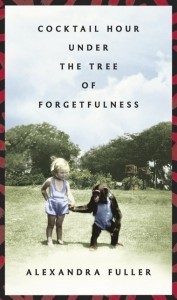
Click to view book on Amazon.
Alexandra Fuller returns to the African landscape in her memoir, Cocktail Hour Under the Tree of Forgetfulness. It accepts the curious task of being both a prequel and a sequel to her 2001 debut, Don't Let's Go to the Dogs Tonight: An African Childhood. With a love of landscape, a historian's lens and a knack for laugh-out-loud satire aimed at her mother's narcissism, Fuller tells the broader story of her family's participation in the Rhodesian civil war.
(Published in The Oregonian, August 28, 2011. Read the full review here.)
Thoughts while driving through San Antonio sprawl
I re-read a 2009 Harper's article by Jamaica Kincaid that asked why we need art and artists. Basically, she said, art is not for its own sake but to help us deal with human mystery–to access a sense of a greater mystery, a secret order to the world. It's a secret, maybe, because one's mind is a mystery most of the time; it's full of stamps from childhood and forgotten infancy. As Jamaica Kincaid says, sometimes she doubts that she ever acts independently of her mother–that every act is a reaction, a response, or a reflection.
In Islam, it's believed that when we die an angel must pull our soul free from where it is lodged in our throat. I wonder if art tries to do the same thing–to snag something secret and intimate to us, and pull it out into plain view. As I drive my errands around San Antonio, expending more gasoline in a few months than I've done in the last 10 years of my life, passing yet another crop of strip malls and filling stations and nail salons and chain restaurants, it occurs to me that Art–in the capital letter sense of the word–is like those angels. It reaches for what's inside of us and pulls it out to remind us that we are not the landscape. It keeps us from choking on the banal.
August 10, 2011
Social media training for authors
Where: Online at Brazen Careerist U
When: September 6-30
Details: The organizers say, "Brazen U's premier Executive Social Media Bootcampis a rigorous 4-week online course that will help you develop and implement a winning social media strategy–whether social media is 10 percent or 100 percent of your job." I'm hoping social media can be 95 percent of the work I do to promote writing and writers. As they say, it's better to learn to fish than to pay a publicist $10K to catch the fish for you.
[image error]

